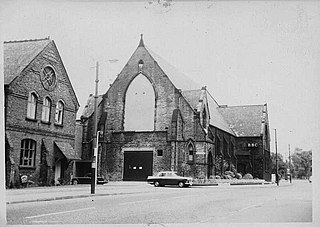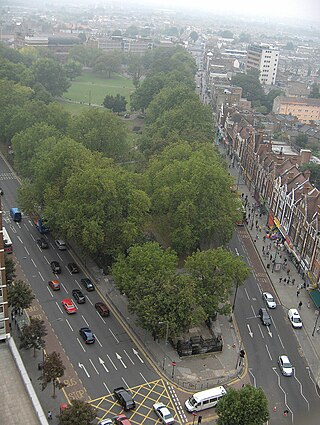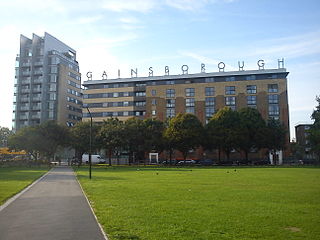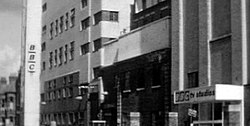
Shepherd's Bush is a district of West London, England, within the London Borough of Hammersmith and Fulham 4.9 miles (7.9 km) west of Charing Cross, and identified as a major metropolitan centre in the London Plan.

The Rank Organisation, was a British entertainment conglomerate founded by industrialist J. Arthur Rank in April 1937, Rank also served as the company chairman. It quickly became the largest and most vertically integrated film company in the United Kingdom, owning production, distribution and exhibition facilities as well as manufacturing projection equipment and chairs. It also diversified into the manufacture of radios, TVs and photocopiers. The company name lasted until February 1996, when the name and some of the remaining assets were absorbed into the newly structured Rank Group plc. The company itself became a wholly owned subsidiary of Xerox and was renamed XRO Limited in 1997.

Television Centre (TVC), alternatively BBC Studioworks Television Centre, is a building complex in White City, West London, which was the headquarters of BBC Television between 1960 and 2013. After a refurbishment, the complex reopened in 2017 with three studios in use for TV production, operated by BBC Studioworks. The first BBC staff moved into the Scenery Block in 1953, and the centre was officially opened on 29 June 1960. It is one of the most readily recognisable facilities of its type, having appeared as the backdrop for many BBC programmes. Parts of the building are Grade II listed, including the central ring and Studio 1.

BBC Birmingham is one of the oldest regional arms of the BBC, located in Birmingham. It was the first region outside London to start broadcasting both the corporation's radio and television transmissions, the latter from the Sutton Coldfield television transmitter.

Sir Michael Elias Balcon was an English film producer known for his leadership of Ealing Studios in West London from 1938 to 1955. Under his direction, the studio became one of the most important British film studios of the day. In an industry short of Hollywood-style moguls, Balcon emerged as a key figure, and an obdurately British one too, in his benevolent, somewhat headmasterly approach to the running of a creative organization. He is known for his leadership, and his guidance of young Alfred Hitchcock.

Gainsborough Pictures was a British film studio based on the south bank of the Regent's Canal, in Poole Street, Hoxton in the former Metropolitan Borough of Shoreditch, north London. Gainsborough Studios was active between 1924 and 1951. The company was initially based at Islington Studios, which were built as a power station for the Great Northern & City Railway and later converted to studios.

The Grove Family was a British television series soap opera, generally regarded as the first of its kind broadcast in the UK, made and broadcast by the BBC Television Service from 1954 to 1957. The series concerned the life of the family of the title, who were named after the BBC's Lime Grove Studios where the programme was made.

Mancunian Films was a British film production company first organised in 1934. From 1947 it was based in Rusholme, a suburb of Manchester, and produced a number of comedy films, mostly aimed at audiences in the North of England.
Tonight was a British current affairs television programme, presented by Cliff Michelmore, that was broadcast on BBC live on weekday evenings from 18 February 1957 to 18 June 1965. The producers were the future Controller of BBC1 Donald Baverstock and the future Director-General of the BBC Alasdair Milne. The audience was typically seven million viewers.

You and Me is a British educational television programme as part of the BBC Schools strand from 14 January 1974 to 26 March 1992. The programmes consisted of various segments intended to educate and entertain young children and included elements for early literacy and numeracy. It is aimed at children aged between 3 and 5.
The Gaumont-British Picture Corporation produced and distributed films and operated a cinema chain in the United Kingdom. It was established as an offshoot of the Gaumont Film Company of France.
Edward Black was a British film producer, best known for being head of production at Gainsborough Studios in the late 1930s and early 1940s, during which time he oversaw production of the Gainsborough melodramas. He also produced such classic films as The Lady Vanishes (1938). Black has been called "one of the unsung heroes of the British film industry" and "one of the greatest figures in British film history, the maker of stars like Margaret Lockwood, James Mason, John Mills and Stewart Granger. He was also one of the very few producers whose films, over a considerable period, made money." In 1946 Mason called Black "the one good production executive" that J. Arthur Rank had. Frank Launder called Black "a great showman and yet he had a great feeling for scripts and spent more time on them than anyone I have ever known. His experimental films used to come off as successful as his others."
This is a list of British television related events from 1950.
The Great Barrier is a 1937 British historical drama film directed by Milton Rosmer and Geoffrey Barkas and starring Richard Arlen, Lilli Palmer and Antoinette Cellier. The film depicts the construction of the Canadian Pacific Railway. It was based on the 1935 novel The Great Divide by Alan Sullivan. It was made at the Lime Grove Studios in Shepherd's Bush. The film's sets were designed by Walter Murton.

The BBC Elstree Centre, sometimes referred to as the BBC Elstree Studios, is a television production facility, currently owned by the British Broadcasting Corporation (BBC). The complex is located between Eldon Avenue and Clarendon Road in Borehamwood, Hertfordshire, England.

Dickenson Road Studios was a film and television studio in Rusholme, Manchester, in North-West England. It was originally set up in 1947 in a former Wesleyan Methodist Chapel by the film production company Mancunian Films and was acquired by BBC Television in 1954. The studio was used for early editions of the music chart show Top of the Pops from 1964.

Shepherd's Bush is a neighbourhood in the London Borough of Hammersmith and Fulham centred on Shepherd's Bush Green. Originally a pasture for shepherds on their way to Smithfield market, it was largely developed in the late nineteenth and early twentieth centuries. In 1844 the West London Railway officially opened, followed in 1864 by the Metropolitan Railway who built the original Shepherd's Bush station, opening up the area to residential development. Businesses soon followed, and in 1903 the west side of Shepherd's Bush Green became the home of the Shepherd's Bush Empire, a music hall whose early performers included Charlie Chaplin.

Islington Studios, often known as Gainsborough Studios, were a British film studio located on the south bank of the Regent's Canal, in Poole Street, Hoxton in the former Metropolitan Borough of Shoreditch, London between 1919 and 1949. The studios are closely associated with Gainsborough Pictures which was based there for most of the studio's history. During its existence Islington worked closely with its sister Lime Grove Studios in Shepherd's Bush and many films were made partly at one studio and partly at the other. Amongst the films made at the studios were Alfred Hitchcock thrillers, Will Hay comedies and Gainsborough Melodramas.
No Lady is a 1931 British comedy film directed by Lupino Lane and starring Lane, Renee Clama and Sari Maritza. It was made at Lime Grove Studios in Shepherd's Bush by Gaumont British, a company linked to Gainsborough Pictures. The film's sets were designed by art director Andrew Mazzei. It was popular enough to be re-released in 1943. While possibly originally intended to top the bill, it was released as a second feature and is classified as a quota quickie.















